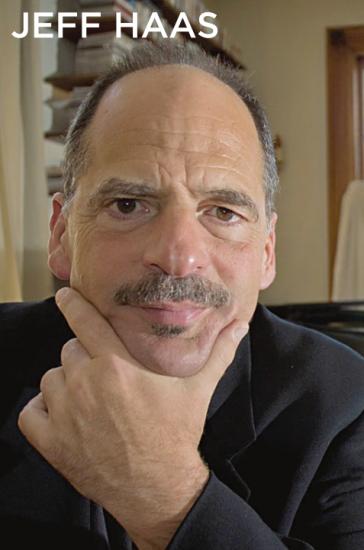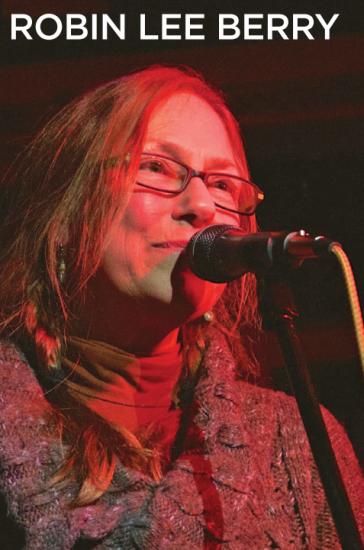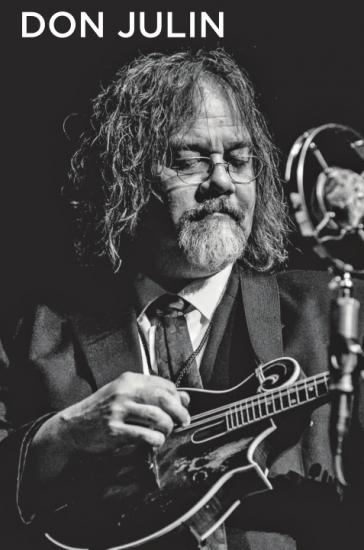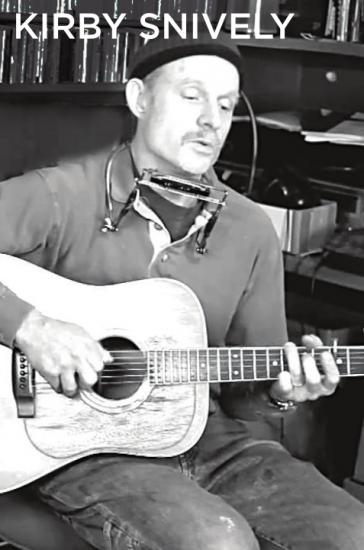The Old Guard
Sept. 2, 2016
Memories, light the corners of my mind…” – Barbra StreisandStreisand may have been singing about a faded love. But memories of northern Michigan’s early music scene are the ones we want to know about. Much like Streisand herself, our local musical celebs have been making music for decades, but they still have an ageless quality about them. So when we say “old guard,” we’re not referring to age, but to experience and experiences. With that in mind, we asked some of our region’s best-known and longstanding musicians to take a look back for us.

Traverse City jazz pianist, avant-garde composer, recording artist, and radio show host. Jeffhaasmusic.com
When Jeff Haas moved to northern Michigan, he was a social worker. Growing up with music, though, meant it was always in his blood; he even studied music in Germany as a teenager. “I had maintained my development as a musician, but I wasn’t performing at the time,” he said. In 1989, his father —accomplished pianist, conductor, and musicologist Karl Haas — asked his son to perform a duet show in Corson Auditorium. “He sent me a stack of music a foot high and said to learn as much as I could,” Haas said, laughing. “The performance was sold out, and I absolutely loved it. I got bit by the jazz bug after that and started working with some local performers.”
But Haas’ connections with the local scene had actually started even earlier. “When I first started coming Up North in the ’70s, I used to go to the Holiday Inn to see Dave Sporney,” Haas said. “He had a 17-piece Big Band that played every Sunday night. I also used to go see the Traverse City Jazz Quartet every Thursday.” The jazz and folk scene then, Haas recalled, wasn’t unlike what it is now, with a range of venues and plenty of hanging out after the shows. “The Sawmill on Front Street had folk music six days a week; the basement club Shields on the east side had variety music. People like Josh White and Arlo Guthrie would pass through Traverse City and play at these great small venues,” he said.
One definite similarity between then and now is the flow of music through the region. “Even back then, there were two entertainment seasons — summer, and the rest of the year,” Haas said. “To a large extent, that’s still true.” Haas worked to expand on what the region had to offer by booking for a Dennos series called Jazz at the Museum, and adding a twist. “As I was booking musicians, I’d write into their contract that, after the Dennos show, they had to play a second set over at Park Place,” Haas said. “Because of that, Park Place hosted shows by Joshua Redman, Nicholas Payton, Kurt Elling, and Ellis Marsalis, so people got to see these nationally breaking artists in a small, intimate setting.”
Through it all, Haas said that the musicians in Traverse City have always been supportive of each other. “The reason Traverse City is a good place to be for me, personally, is because my career has been a collaboration with this community. They come out for everything I do, whether it’s a jazz classic or something completely edgy and avant-garde. It’s a real symbiotic relationship. The audiences here are less about ‘prove yourself,’ like they would be in a big city — they’re more about being part of the development of original musicians.”

Boyne City singer-songwriter, music mentor, and co-owner of Freshwater Gallery and Concert Series. Robinleeberry.com
Back in the ’80s, at the beginning of Robin Lee Berry’s career, she definitely felt like she was in the minority in northern Michigan. She’d been playing music in Lansing and had moved to Charlevoix to be part of a band that played at the Weathervane. “There were only a handful of women playing music here at that time,” Berry said. “I was trying to make a living doing what I felt was my true calling, and I mostly played solo and had my own gear, which helped. It’s wonderful to see so many women now embracing the lifestyle!” The best memories of those early years for Berry were the open mic shows in the area. “It was a great way to enter the scene, so I attended as often as possible,” she said. “Eventually I was asked to host Tuesday nights at the Sawmill, and then later at JRR’s Warehouse, where I met a lot of wonderful musicians.” She also released her own Wait for the Rush album during this time. “Back then, cassettes were the new medium for recordings, so I was being state of the art to cut a cassette!” Disco was still big when Berry arrived Up North, but she remembers a wider diversity of sounds here, from acoustic groupings and country to rock bands and piano bars. “Union Street Station was where it was at, and I was drawn to the horn bands and jazz groups like Newt and the Salamanders, and Bob James and Equinox,” Berry said. “Sitting in with Equinox was a real ‘moment’ — I became their singer and also started working with The Reef Petroleum Big Band. Exciting times!” She also performed at the very first Blissfest and has worked with the festival ever since. It’s one of her favorite memories of her beginnings in music here, but there are many more.
“Being a folk musician can seem so romantic,” Berry said. “But I remember going to a gig after a deep snow here, having to drag my gear on a sled for a quarter mile. Some of the best moments were playing music for friends, being on stage at the Dennos, opening for Rory Block and Garnet Rogers and Greg Brown, and sneaking into the green room at the Traverse City Film Festival and eating their cookies before our pre-film performance. That was all fun! But most of all, it’s always best when the audiences were kind. And they still are.”

Traverse City alternative folk artist and virtuoso mandolin player and instructor. Donjulin.com
His parents, who wanted to avoid raising their growing family in an urban environment, escaped Detroit for Elk Rapids when Don Julin was nine years old. As a young adult, Julin found his way to Traverse City and edged into the local music scene with his first band, The Microtones, which he said created quite a stir in town in the early ’80s. “We were one of the first rock-ish bands to play ‘alternative’ music, which by today’s standards doesn’t seem very radical at all — Talking Heads, The Clash, Bob Marley, The Specials — hardly offensive,” Julin said.
Early on, he just wanted to be accepted as one of the hometown boys who could play music. “Drinking and driving was still popular back then, so the bar scene was thriving,” he said. “I remember a large variety of musical styles in Traverse City. Rock was big, and many touring acts — like REO Speedwagon, Todd Rundgren, and Styx — played at the Glacier Arena, which is now an auto parts warehouse on Barlow Street.
During that era, Julin said, there were many venues around town that had live music, from The Sawmill to Union Street Station, JRR’s Warehouse, and Tanz Haus. “There were at least a dozen places that had stages and dance floors, and where people paid cover charges to see and dance to live music,” he said. “There was even a teen dance club called the BOGI that had a stage for live bands. You could actually play in a weekend band and make enough money to pay rent on a cheap apartment!” Some of Julin’s best friends today are musicians that he met through the music scene back in the ’80s. “It was competitive in that each band wanted to sound better than the other bands, but we all supported each other going to each other’s shows,” he said. Some of his favorite personal memories include having a No. 1 record on WNMC Radio in 1983 with The Microtones (he achieved this again in 2013 with Billy Strings) and meeting Bob Seger at Legs Inn in Cross Village.
“Later that same year, Seger came out to see us play in Dearborn and bought us all drinks,” Julin said.
So how does he feel the local music scene has changed since he first became part of it? “One thing that has changed is that it is much more acceptable to play your own music in Traverse City these days than it was 30 years ago. Back then, ’70s and ’80s cover bands were all the rage.”

Traverse City jazz-pop artist who released her first solo album, Firedance, last year. Facebook. com/janicekeeganmusic
Born in Detroit and raised in the Motor City’s northwest suburbs, Janice Keegan arrived in Traverse City after college, having secured a graphic design job in town. “When I first arrived, I sang at the open mics and often had other musicians take an interest in my singing,” Keegan said. “Unfortunately, they wanted me to sing music I had no interest in.”
But in 1989, she met a fellow musician who would help turn that situation around. “Glenn Wolff had an office across the street from my office in Front Row Center,” Keegan said. “Once we realized we shared a love of music, we tried jamming in his office space, and it clicked.”
From there, Keegan joined Wolff and another guitarist, David Poinsett, and formed The Janice Keegan Band. “I could finally sing music I loved!” Keegan said. They began performing live, the first time at the Power House Tavern in Lake Leelanau. “The place was jam packed,” Keegan recollected. “People lined up outside as they wanted to know what we were up to.” Soon, the trio added Laurie Sears on saxophone and Hank Dempsey on drums. They’d go on to play jazz, blues, and original music in Traverse City for the next five years.
Blues and rock were the mainstays at most every venue at the time, Keegan said. The Janice Keegan Band didn’t really fit either description, “but we were happy with the number of gigs we had,” Keegan said. Keegan would reconfigure her trio several times and eventually focused more on jazz music. One of her favorite moments was when her band played to a sold-out house in the Milliken Auditorium. But by the mid ’90s, she was watching karaoke take over. “It became part of pop culture everywhere and seriously cut into the number of venues offering live music,” she sald. “When they did begin hiring musicians again, they leaned toward solo or duo acts to keep costs down, and they still do.”
In spite of that, Keegan said she’s noticed that there are far more musicians on the local scene now than 20 years ago, and they’re starting earlier. “There seem to be a greater number of young people interested, willing, and determined to make music their primary source of income. This is very different than what I observed in the past,” she said. She said she’s seeing a similar change in people’s attitude toward music as a career. “My parents came from a place of post-Depression scarcity and so encouraged us to find ‘secure and legitimate’ sources of income. Now there doesn’t seem to be the same fear about sustenance as there once was. Instead of a parent ranting, ‘You’d better find a real job that you can support yourself with,’ I think they are more likely to say, ‘Music. What a lovely idea. What can we do to help?’

Good Hart folk music artist, singer-songwriter and local music festival staple.
Kirbysnivelymusic.com
Kirby Snively grew up near Good Hart, north of Harbor Springs. He left to travel the world with his music and then returned, built a house in Good Hart, and continued his career in northern Michigan. “I basically went full circle,” he said. Snively started playing music when he was eight years old; his first instrument was the baritone ukulele. “Which is funny, because now there’s a revival of that instrument,” he said. He soon switched to guitar and has played guitar ever since. He’s a literal music fixture in the Harbor-Petoskey area, playing its festivals, local venues, private parties, and street music events.
“At the ripe old age of 56, I’m still doing it,” he said. “These days I play what I like to call Americana music — lots of story-based originals of my own, plus covers that I wish I’d written.” Playing Up North started around 1985 for Snively, when he first took gigs on Mackinac Island at the Chippewa Hotel, Horn’s Bar, and the Pink Pony after leaving college in 1982. “I also played at Legs Inn back then. Today I still play there once a week, and I’ll do so until my hands fall off!” he said.
Back then, he said, much of what he and the other singer-songwriters in the region relied upon in their setlists were songs from the ’70s — tunes by bands like The Eagles, Fleetwood Mac, The Rolling Stones, Warren Zevon, Jimmy Buffett. “Funny thing is, a lot of songs people play here haven’t changed that much,” Snively said. “We still play a lot of those exact same songs now. So I try to learn more obscure songs by those artists — not just, for instance, ‘Margaritaville’ by Jimmy Buffett, but other tunes from deeper into his albums.”
Karaoke made an impact on Snively when it arrived on the scene in the ’90s, and not in a way that he particularly liked. “I remember when karaoke came into northern Michigan,” he said. “All the bar owners were saying, no, don’t worry, it won’t replace you guys. But for a while, it did. It really did. Everything was karaoke, and we folk singers were left in the dust.”
He felt that the scene Up North changed after that, as venues became more hesitant to hire in performers once they’d found out how cheap entertainment could — even if the entertainment was just karaoke. “I think a lot of places don’t have live music here anymore because they can’t afford it,” Snively said. “And karaoke kind of set that precedent. A lot of things have changed over the years. But in the end, people do appreciate live music, so I don’t think it will ever completely go away.”
Trending

The Valleys and Hills of Doon Brae
Whether you’re a single-digit handicap or a duffer who doesn’t know a mashie from a niblick, there’s a n... Read More >>
The Garden Theater’s Green Energy Roof
In 2018, Garden Theater owners Rick and Jennie Schmitt and Blake and Marci Brooks looked into installing solar panels on t... Read More >>
Earth Day Up North
Happy Earth Day! If you want to celebrate our favorite planet, here are a few activities happening around the North. On Ap... Read More >>


